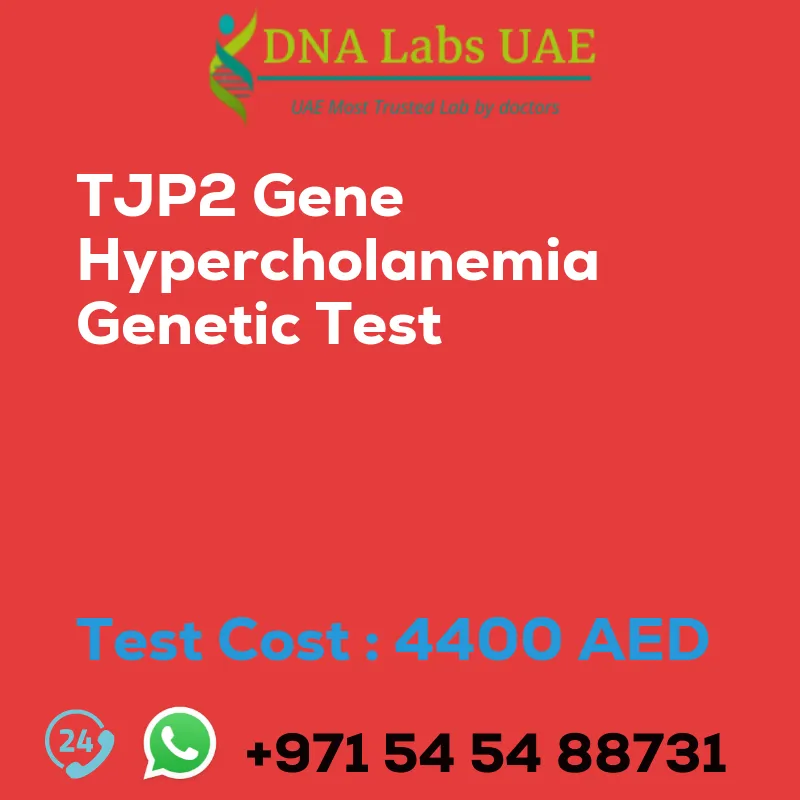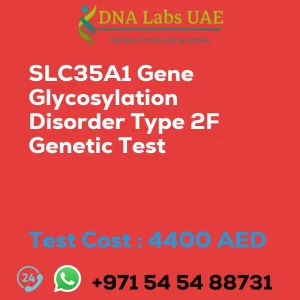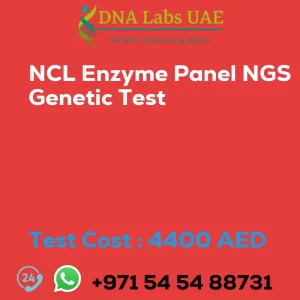TJP2 Gene Hypercholanemia Genetic Test
Cost: AED 4400.0
Symptoms, Diagnosis, and Test Details
TJP2 gene hypercholanemia is a rare genetic disorder caused by mutations in the TJP2 gene. This gene is responsible for producing a protein called tight junction protein 2, which plays a role in maintaining the integrity of tight junctions between cells in the liver and intestine.
When mutations occur in the TJP2 gene, the normal functioning of tight junctions is disrupted, leading to the accumulation of bile acids in the liver and intestine. This condition, known as hypercholanemia, results in an excess of bile acids in the blood.
To diagnose TJP2 gene hypercholanemia, a genetic test called Next-Generation Sequencing (NGS) is performed. NGS is a high-throughput sequencing technology that allows for the simultaneous sequencing of multiple genes or even the entire genome. It can detect mutations in the TJP2 gene associated with hypercholanemia.
The NGS genetic testing process involves obtaining a blood or saliva sample from the individual being tested. The DNA in the sample is then extracted and sequenced using NGS technology. The resulting sequence data is analyzed to identify any mutations or variations in the TJP2 gene.
If mutations are detected in the TJP2 gene, the results of the NGS genetic test can confirm a diagnosis of TJP2 gene hypercholanemia. This information is crucial for determining the most effective treatment approach and providing genetic counseling to affected individuals and their families.
Test Information
- Test Name: TJP2 Gene Hypercholanemia Genetic Test
- Components: NGS Technology
- Price: AED 4400.0
- Sample Condition: Blood or Extracted DNA or One drop Blood on FTA Card
- Report Delivery: 3 to 4 Weeks
- Test Type: Metabolic Disorders
- Doctor: General Physician
- Test Department: Genetics
- Pre Test Information: Clinical History of Patient who is going for TJP2 Gene Hypercholanemia NGS Genetic DNA Test. A Genetic Counselling session to draw a pedigree chart of family members affected with Hypercholanemia.
Please note that TJP2 gene hypercholanemia is a rare disorder, and genetic testing may not be readily available in all healthcare settings. It is recommended that individuals suspected of having this condition consult with a medical geneticist or other healthcare professional with expertise in genetic disorders for appropriate testing and management.
| Test Name | TJP2 Gene Hypercholanemia Genetic Test |
|---|---|
| Components | |
| Price | 4400.0 AED |
| Sample Condition | Blood or Extracted DNA or One drop Blood on FTA Card |
| Report Delivery | 3 to 4 Weeks |
| Method | NGS Technology |
| Test type | Metabolic Disorders |
| Doctor | General Physician |
| Test Department: | Genetics |
| Pre Test Information | Clinical History of Patient who is going for TJP2 Gene Hypercholanemia NGS Genetic DNA Test A Genetic Counselling session to draw a pedigree chart of family members affected with Hypercholanemia |
| Test Details |
TJP2 gene hypercholanemia is a rare genetic disorder that is caused by mutations in the TJP2 gene. This gene provides instructions for making a protein called tight junction protein 2, which is involved in maintaining the integrity of tight junctions between cells in the liver and intestine. Mutations in the TJP2 gene disrupt the normal functioning of tight junctions, leading to the accumulation of bile acids in the liver and intestine. This results in a condition known as hypercholanemia, where there is an excess of bile acids in the blood. To diagnose TJP2 gene hypercholanemia, a genetic test called Next-Generation Sequencing (NGS) can be performed. NGS is a high-throughput sequencing technology that allows for the simultaneous sequencing of multiple genes or even the entire genome. It can detect mutations in the TJP2 gene that are associated with hypercholanemia. NGS genetic testing involves obtaining a blood or saliva sample from the individual being tested. The DNA in the sample is then extracted and sequenced using NGS technology. The resulting sequence data is analyzed to identify any mutations or variations in the TJP2 gene. The results of the NGS genetic test can confirm a diagnosis of TJP2 gene hypercholanemia if mutations are detected in the TJP2 gene. This information can be useful for determining the best treatment approach and for providing genetic counseling to affected individuals and their families. It is important to note that TJP2 gene hypercholanemia is a rare disorder, and genetic testing may not be readily available in all healthcare settings. Therefore, individuals suspected of having this condition should consult with a medical geneticist or other healthcare professional with expertise in genetic disorders for appropriate testing and management. |








